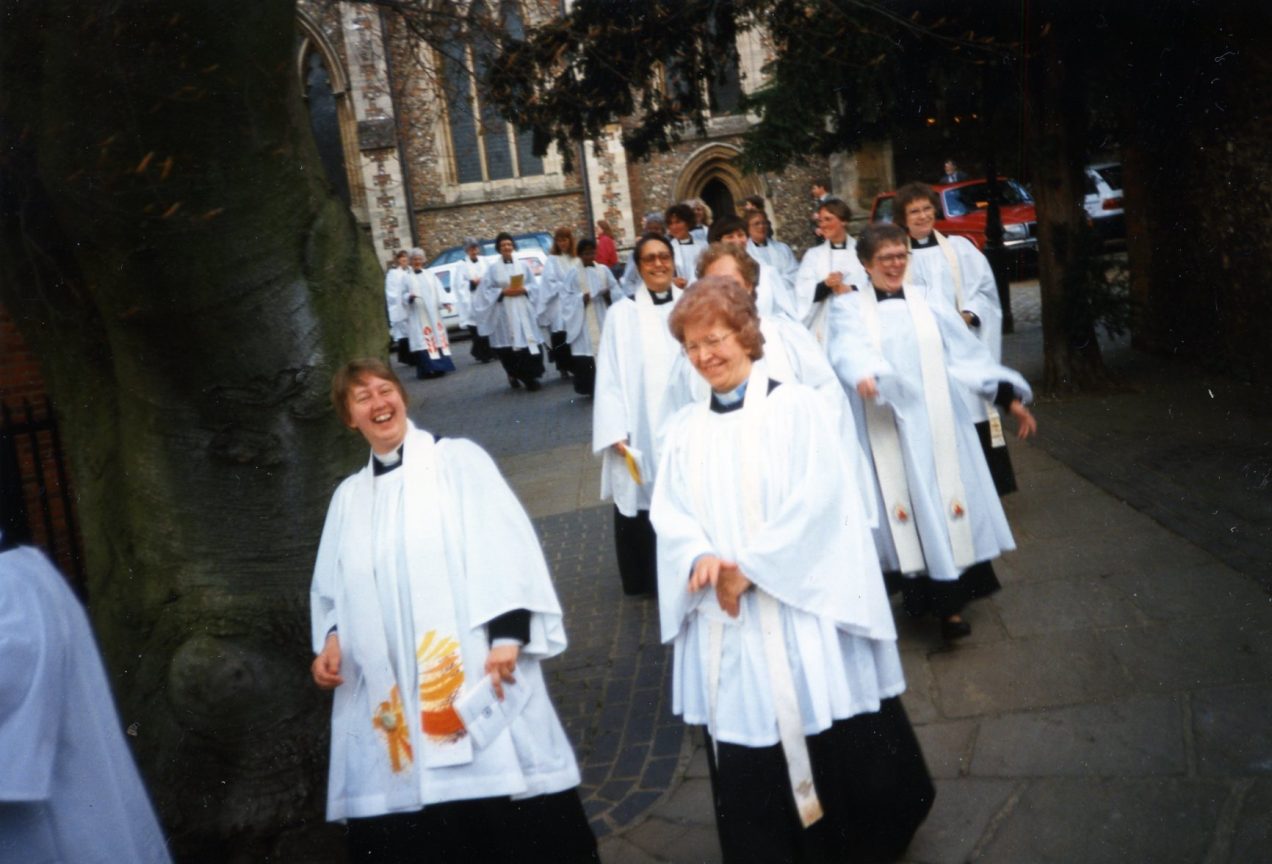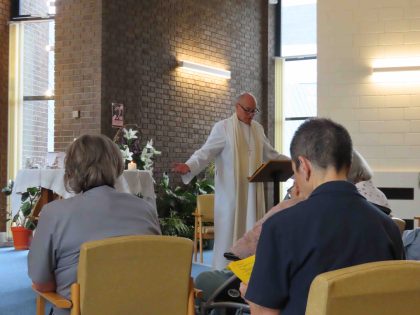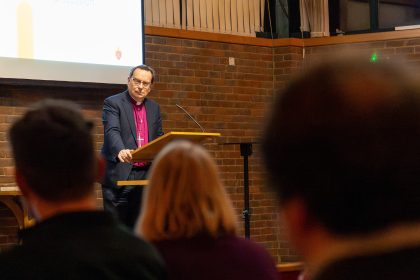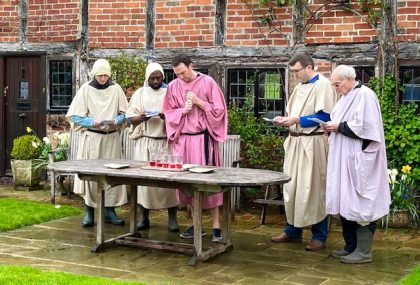To mark 30 years since the first services to ordain women as priests in the Church of England, we spoke to two women in our diocese who were ordained in the first cohort of 1994…
The Very Reverend Catherine Ogle, Dean of Winchester, reflects on the changes in the Church since women were first ordained as priests and the work that still needs to be done…
It has been a great privilege to be part of historic change to ordain women to the priesthood in the Church of England. For the past thirty years I have loved life and ministry as a priest, and for six years before that as a deacon. I’ve served a curacy in South Leeds, then a secondment period at BBC Leeds, followed by ten years as Vicar of Huddersfield, then Dean of Birmingham and now Dean of Winchester.
I first embraced Christianity as a teenager and had absolutely no idea of the possibility of women becoming priests. This was something beyond my imagination. Though God’s call to me, at the age of 21, was hard at first to comprehend, yet, over the next couple of years I was given courage to say ‘yes’ and become part of a movement of Spirit-led change that has transformed the church.
‘Christ has no body now on earth but yours.’
When St Teresa wrote her famous prayer, ‘Christ has no body now but yours…’ she was affirming the teaching of scripture, that the gifts and calling of the Holy Spirit are available to all people. We are all called to be the hands and feet, the eyes, and the heart of Christ in the world. The promise of our baptism, identical for boys and girls, is that the gifts of the Holy Spirit are for everyone. The gifts are not gendered. The Holy Spirit offers an equal opportunity!
I was born into a more gendered world where, on the whole, there was still a division between men’s and women’s work. However, this was changing, and women were aspiring to enter all aspects of the work force. In this context people began to question why women might not offer their gifts and skills as ordained ministers and the church benefit from the gifts of all the people of God.
But it’s vital to say that the movement to ordain women was always about more than ‘jobs for the girls’. There is a deep symbolic and sacramental significance to ordination that carries a profound message about humanity made in Gods image. In a world of binary difference, it was easy to slip into stereotypes of men being seen as leaders, spiritual and intellectual (and identifying these characteristics as ‘first-class’) with women being seen as those who serve and are earthly and emotional (and these characteristics are seen as ‘second-class’).
However, Jesus is the Saviour who loved women, treated them with respect and affirmed their agency. Despite conventions of the time, Jesus had women friends travelling with him and ministering to him. Women were last at the cross and first at the resurrection. Women held leadership roles in the early church.
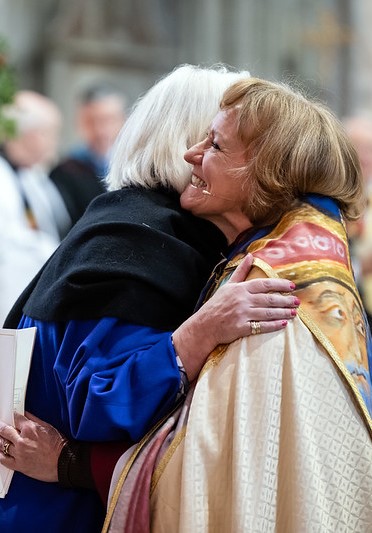
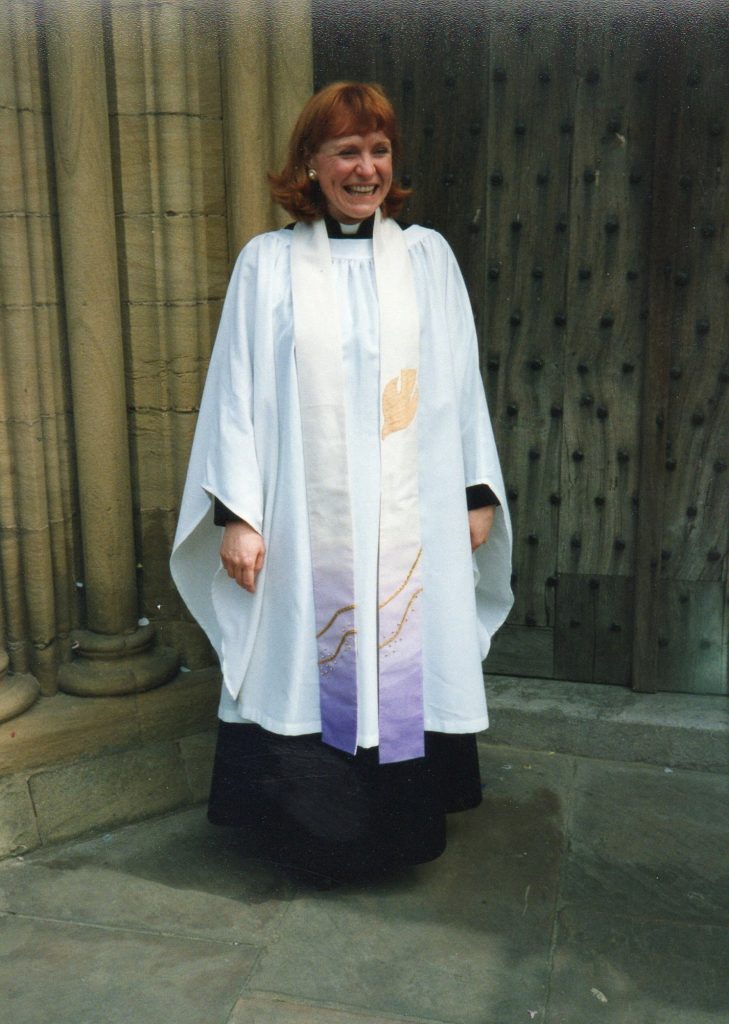
LISTEN TO THE PODCAST…
Canon Peggy and Dean Catherine reflect on 30 years since the ordination of women priests >>>
I believe that men and women priests, ministering alongside one another, witnesses to humanity wonderfully made in Gods image and the freedom of the Holy Spirit to gift and call without discrimination. In my experience, many men find serving alongside women colleagues to be a liberating experience for them too.
A priest has a particular representative role, handling holy things on behalf of the body of Christ and on behalf of God. It’s important that both men and women take the role of representing humanity and representing God for the community. In this way our faith that we are made in Gods image, male and female is embodied and affirmed.
‘Did we get you because we ordered the cheap coffin?’
During my lifetime women have made great strides in terms of equality and opportunity to contribute to every aspect of life. However, sadly, there are still great challenges in the church and in our wider culture and world. We see examples around the world that rights and privileges once gained can be taken away again.
Modern technology enables sexism and misogynistic bullying and threats to increase, rather than diminish, for girls and women in their private and public lives. Globally, the UN estimates that almost one in three women has been subjected to physical or sexual violence at least once in her life. This figure does not include sexual harassment. Women’s and girls’ safety from violence and threat is surely at the heart of human rights.
Sadly, the attitudes behind these statistics can play out in microaggressions that women experience daily, including in the church. Shortly after we had been ordained as priests, my friend went to do a funeral visit. She knocked on the door and a man opened it and said, ‘Did we get you because we ordered the cheap coffin?’ She took this in her stride, but afterwards we wondered, was he being deliberately sexist, or simply rude, or in some clumsy way trying to be funny? Women clergy, including Bishops, still face sexist and rude comments and ‘jokes’ that are not funny. These can be a way of undermining the authority given to women by the church and the dignity given to us by God. As Christian men and women we need to work together to create a culture where this kind of behaviour is unacceptable.
So, I hope that we will pause and make time this year to celebrate the change brought about 30 years ago and its wider significance. That women and men are made in Gods image and that the Spirit’s gifts are available to all. That, at long last, with joy, for the past 30 years women and men have been able to offer themselves to serve the church as priests and know that in Christ’s service is perfect freedom.
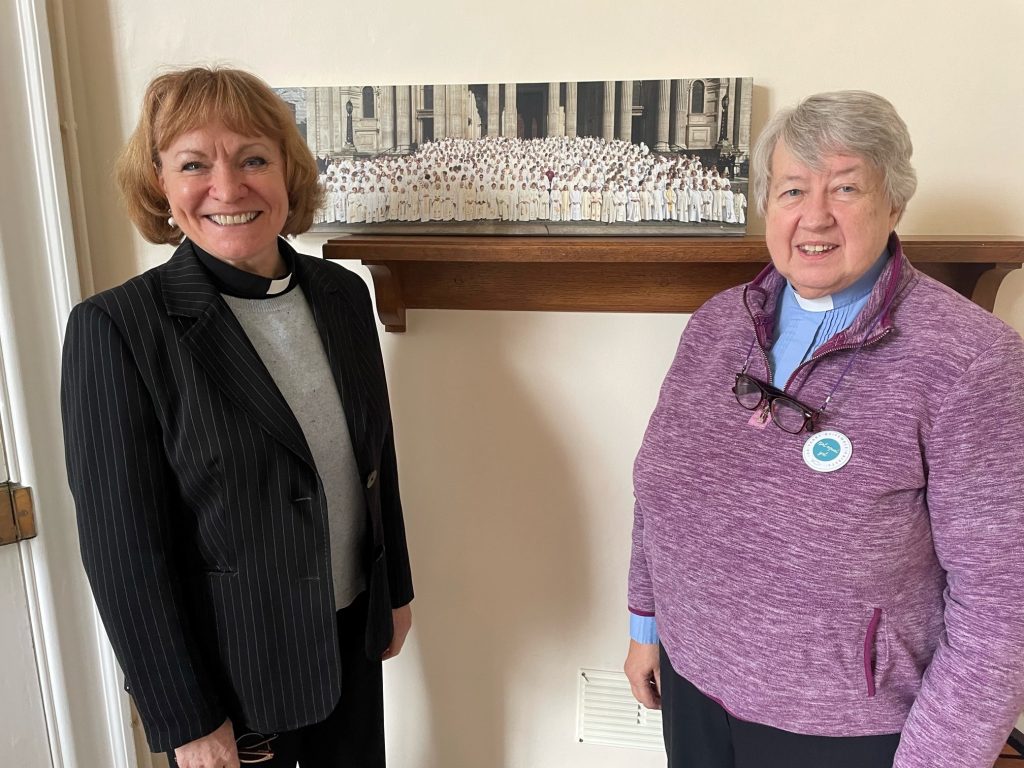
Canon Peggy Jackson, former Archdeacon of LLandfaff, who was also amongst the first women to be ordained as priests in the Church of England, writes about her memories of that momentous occasion…
For me, the seminal moment of change in the CofE was the General Synod vote to allow women to be ordained as priests – on 11th November 1992. An amazing day when we discovered how much the nation as a whole, beyond church circles was still interested in what the CofE had to say about the big questions of the day, and about women’s place in particular. There was genuine elation and positive support for the decision on women’s priesthood – members of the public, strangers, crossed the street to congratulate us, and more than a few found their respect restored for the CofE, as a church which could once more claim to reflect, and speak with integrity, into all parts of society. For evidence, just remember the Vicar of Dibley – which, with wonderful comic insight, made women in ministry, and women as priests, ’normal’ at last, in our national church.
In the years after, as ordained women became visible in every sphere of church life, there were major shifts in attitudes and perception. As women, we were inevitably still a minority in meetings and teams dominated by men, but our male colleagues were often among the first to welcome a shift from the former male-only dynamics. The church was also ready for change, to develop collaborative team working at all levels, and many of us women found that instinctively we understood how this worked. For me, those early years were as much about discovering, and learning to value, my own gifts as God-given for the good of the church, as it was about trying to ‘prove’ my validity, by doing things just the same way as the men. I had to start believing and trusting in what women’s ordination actually ‘meant’ – in the church, and for our witness as Christians in the world: that women are fully as normative as men, of what a human being truly is. We take our authority as human-beings, to live and act and speak in the world, from our unique baptism in Christ, and not as a gift mediated through men in the church.
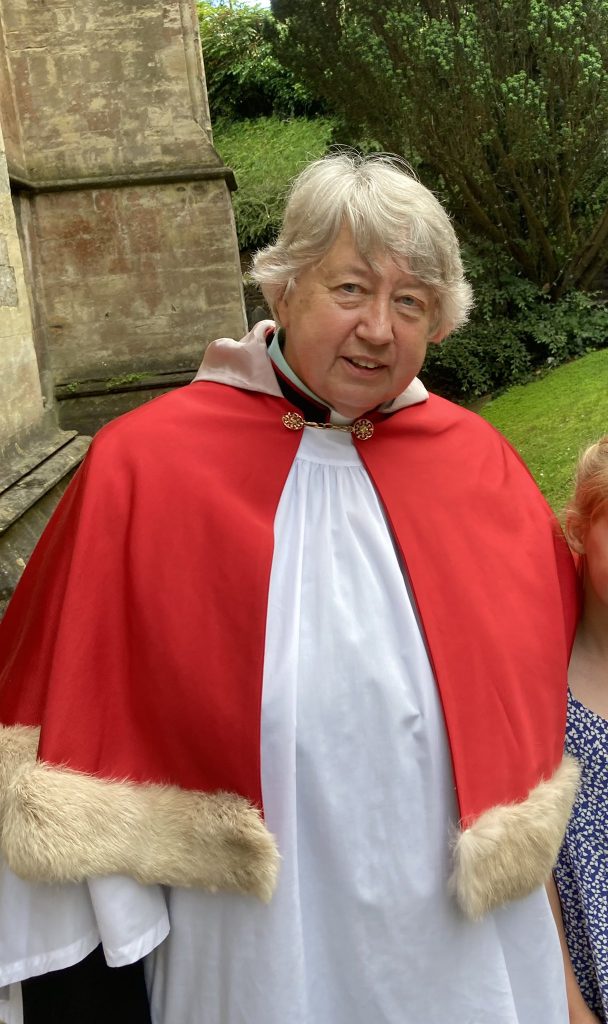
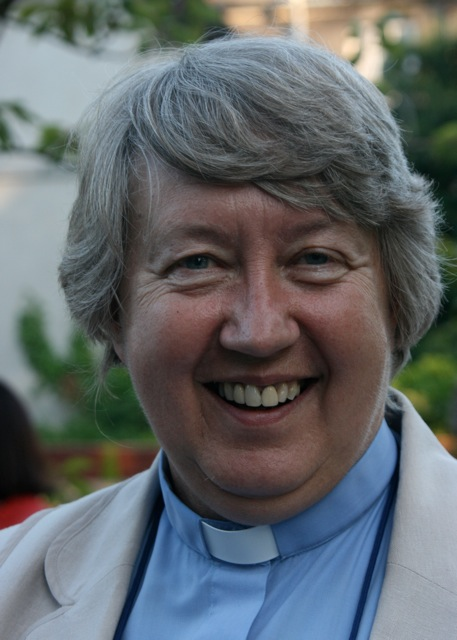
In parish life for me, there were some early and significant changes. I very soon found women approaching me to talk, and to seek help, often after decades of silence, because they were survivors of childhood sexual abuse, or domestic violence. They dared to approach me, because I was a women and a priest, and they brought with them the opening-up of a whole new area of ministry, which had always been closed to an all-make priesthood. It was painful and often very shocking – but also a privilege, to think that at last the church could begin to hear and face the truth of these difficult issues, instead of being seen as so often colluding with, or even perpetuating, the problem.
Alongside these positive stories, however, has also been a persistent undercurrent, and a painful realisation among women in ministry, that the CofE has not yet learned fully to embrace, and to celebrate, the many blessings it opened up, with the decision to ordain women. Beginning with the Act of Synod in 1993, but today still built into the structures of ministry by the Five Guiding Principles, and explicitly with no time limit, there is de facto schism at work. Solely over attitudes towards the validity of women’s orders, clergy and parishes may refuse the oversight of their lawful diocesan bishop, and petition for alternative oversight from another. This is said to be needed to assure the mutual flourishing in the CofE of those with a wide spectrum of opinion over women. But it is hard to see how women themselves, lay or ordained, can ever be expected to flourish, and to realise the fullness of their ministry in Christ Jesus, in a church where their flourishing is said to depend upon the gracious acceptance of structures which are in place specifically to deny them.
In spite of this, I believe the last thirty years have seen a flowering of women’s gifts made available to the church through ordination, and realised in the blossoming of varied ministries. Younger women with their vocations recognised are indeed God’s new gift to the church, and a source of great hope. I just pray for a CofE which can learn to embrace that with unfettered joy and celebration.
*The views expressed in this post and the linked podcast are those of the individuals interviewed, and do not necessarily reflect the views of the diocese or its bishops.

